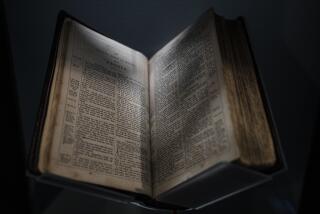COLUMN RIGHT/ RICHARD JOHN NEUHAUS : Is Prayer to Remain Privatized? : Traditions reaching back to the Founders are laid waste.
- Share via
The Supreme Court “lays waste a tradition” as old as the country itself. So said Justice Antonin Scalia writing in dissent from Lee vs. Weisman, the decision that forbids prayer at public-school ceremonies. Writing for the narrow majority of 5 to 4, Justice Anthony M. Kennedy said that the issue was essentially decided in the early 1960s, when the court outlawed government-sponsored prayer in public-school classrooms. Kennedy’s role in the decision surprised many, because he had earlier said that court decisions too often indicated a “hostility to religion.”
In the last 45 years, few areas of law have been so fraught with confusions as church-state rulings. At issue is the religion clause of the First Amendment with its two provisions, one prohibiting the “establishment” and the other guaranteeing the “free exercise” of religion.
The conventional wisdom is that these are two clauses that must somehow be “balanced” against one another. In that approach, almost any connection between religion and government is deemed unconstitutional, with the result that the free exercise of religion is excluded from large sectors of public life. Against the conventional wisdom, a growing number of legal scholars contend that there is only one religion clause and that the “no establishment” provision is in the service of “free exercise.” They agree with former Chief Justice Warren Burger that the religion clause has been “turned upside down” in decisions that give priority to “no establishment” at the expense of the free exercise that the Constitution guarantees. In Lee vs. Weisman, the conventional wisdom prevailed, at least for a time.
It may not be what lawyers call a stable decision. Not only was it decided by a majority of one, but two of the majority (Justices Harry A. Blackmun and John Paul Stevens) may retire in the near future. And, although she joined the majority in this decision, Justice Sandra Day O’Connor has indicated that she is not happy with the precedents on which Weisman is based. In addition, in his majority opinion Kennedy emphasizes that this is a very narrow ruling, aimed only at avoiding government coercion in sponsoring explicitly religious ritual.
The minority of four (Chief Justice William H. Rehnquist and Scalia, Clarence Thomas and Byron R. White) raises several challenges to Weisman. The claim that the graduation prayer involved coercion, they convincingly argue, is based on psychological speculations outside the competence of the court. (They suggest that Weisman can be effectively nullified if schools merely state that participation in prayer is voluntary.) They further note that the same logic that prohibits graduation prayers must prohibit the recitation of the Pledge of Allegiance with its reference to a nation “under God.” The minority opinion saves its heaviest fire, however, for rebutting Kennedy’s claim: “The design of the Constitution is that preservation and transmission of religious beliefs and worship is a responsibility and a choice committed to the private sphere.”
That claim, the minority contends, is patently false. The contention is backed up by a review of American history that cites the Declaration of Independence, numerous policy provisions such as military chaplaincies, and the practice of presidents from Washington to Bush. That is the tradition to which Weisman “lays waste,” according to the minority. The minority asserts that an interpretation of “no establishment” that makes it unconstitutional for Americans and their government to do what they have been doing from the founding to the present is manifestly wrongheaded. Moreover, the majority opinion is alarmingly “statist.” It suggests that “public” means “governmental” and whatever is not governmental is shoved out of the public square into “the private sphere.” But, as the minority persuasively argues, religion is not just individualistic and private; it is also communal and public. For the court to prohibit the American people from giving public expression to their deepest convictions and aspirations is profoundly anti-democratic.
The secularist bias prolonged by Weisman is strongly opposed by the great majority of Americans who, like the minority of the court, favor a more flexible accommodation between religion and government. In the next case that comes along, only one more vote is needed for the court to make clear that the separation of church and state does not mean the separation of religion from public life. Meanwhile, Weisman will no doubt intensify the push for school choice as more and more parents reject a government school system that is indifferent or hostile to the convictions and practices that they would transmit to their children.
More to Read
Sign up for Essential California
The most important California stories and recommendations in your inbox every morning.
You may occasionally receive promotional content from the Los Angeles Times.













